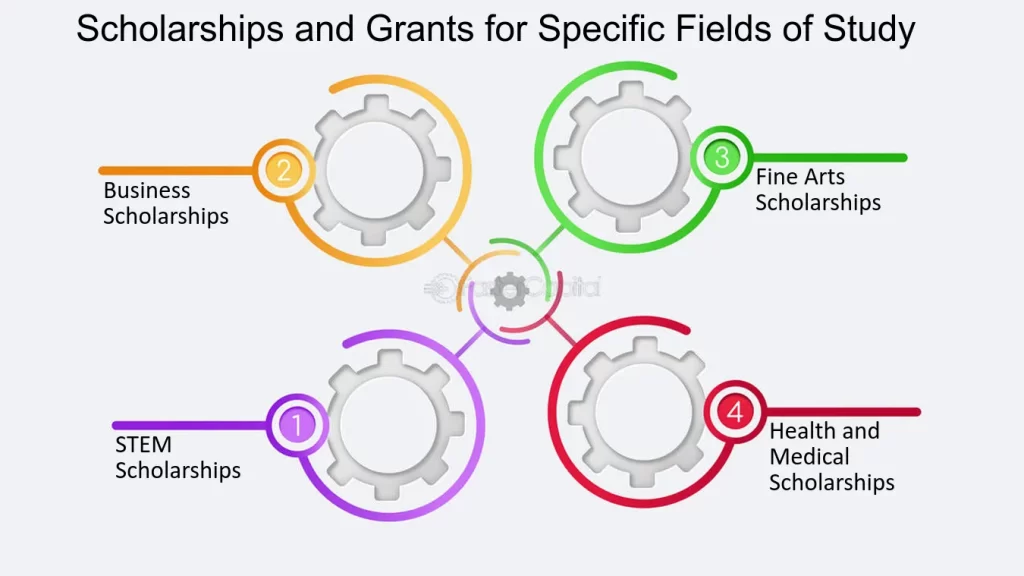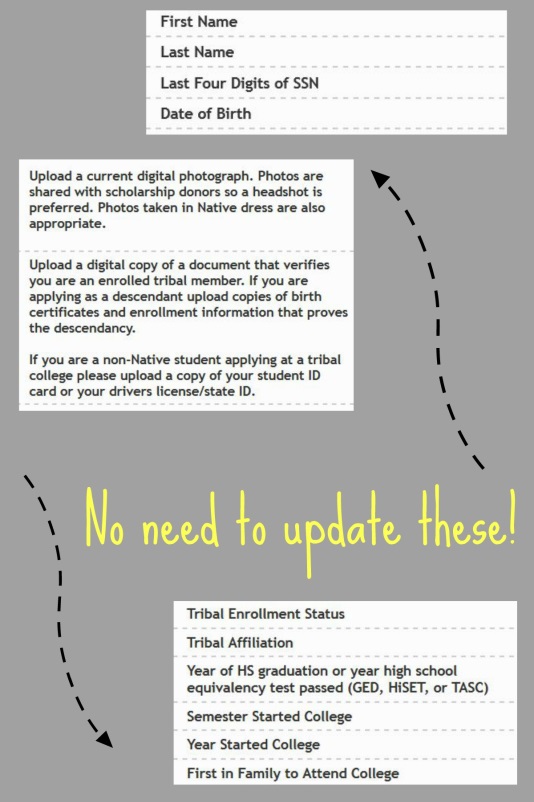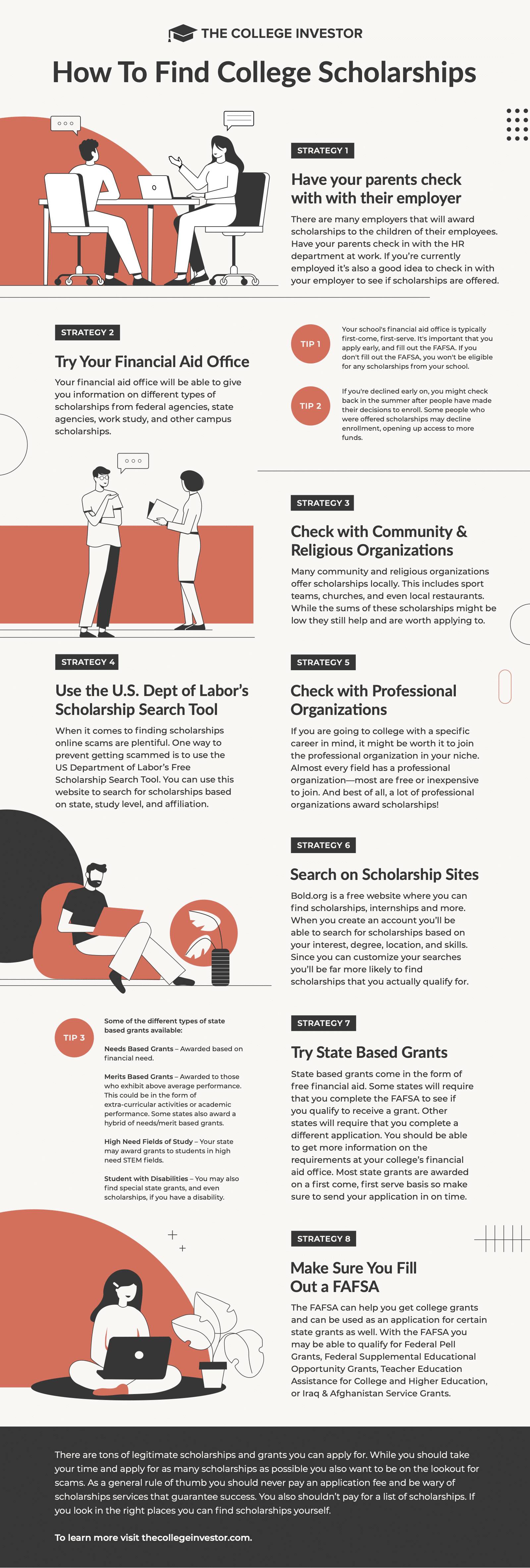How to Secure Scholarships for Specialized Fields of Study

Securing scholarships can be a game-changer for students pursuing specialized fields. The rising cost of education often presents a significant barrier, but scholarships offer a pathway to alleviate financial burdens and fully immerse oneself in demanding academic pursuits. This article serves as a comprehensive guide, unraveling the intricacies of identifying and securing funding opportunities specifically tailored to niche areas of study. From uncovering hidden scholarship gems to crafting compelling applications that showcase your unique expertise and passion, we'll equip you with the strategies needed to maximize your chances of success in the competitive scholarship landscape. Prepare to unlock your potential and transform your academic aspirations into reality.
How to Secure Scholarships for Specialized Fields of Study
Gaining financial support for specialized fields of study requires a strategic and proactive approach. Scholarships are highly competitive, and applicants need to demonstrate not only academic excellence but also a clear passion and aptitude for their chosen field. This means understanding the specific requirements and priorities of different scholarship providers and tailoring your application to highlight your unique skills, experiences, and potential contributions to the field. It's crucial to start the scholarship search early, meticulously research available opportunities, and craft compelling essays and personal statements that showcase your commitment to your specialized area of study. Finally, securing strong letters of recommendation from professors or mentors who can speak to your abilities and dedication is paramount to increasing your chances of success.
Research Scholarships Specific to Your Field
The first step is to identify scholarships specifically designed for your area of specialization. General scholarships are widely available, but those targeting specific fields, such as engineering, medicine, or the arts, often have fewer applicants and offer higher award amounts. Use online databases like Fastweb, Scholarships.com, and Peterson's to filter scholarships based on your field of study, academic level, and other relevant criteria. Explore professional organizations and associations in your field; they frequently offer scholarships to students pursuing related degrees. Don't overlook smaller, local scholarships that may be less competitive. Targeting scholarships directly related to your specialization increases your chances of standing out from the broader applicant pool.
Highlight Relevant Skills and Experiences
Your application should demonstrate a clear connection between your skills, experiences, and your chosen field of study. Emphasize relevant coursework, research projects, internships, volunteer work, and any other activities that showcase your aptitude and passion. For instance, if you're applying for a scholarship in computer science, highlight your coding projects, participation in hackathons, or contributions to open-source software. If you're pursuing a career in medicine, emphasize your volunteer experience in healthcare settings or research experience in biomedical labs. Quantify your achievements whenever possible (e.g., "Developed a program that reduced processing time by 20%"). Make sure to align your skills with the requirements of the specific scholarship.
Craft a Compelling Personal Statement
The personal statement is your opportunity to showcase your personality, passion, and vision for your future in your specialized field. It's not just a recitation of your resume; it's a chance to tell your story and explain why you're the ideal candidate for the scholarship. Focus on demonstrating your genuine interest in the field, your commitment to making a contribution, and your understanding of the challenges and opportunities it presents. Share specific anecdotes that illustrate your dedication and experiences that have shaped your aspirations. Tailor your personal statement to each scholarship, highlighting how your goals align with the organization's mission. Authenticity and passion are key to making a lasting impression.
Obtain Strong Letters of Recommendation
Letters of recommendation carry significant weight in the scholarship application process. Choose recommenders who know you well and can speak to your abilities, work ethic, and potential for success in your chosen field. Professors, mentors, supervisors, or advisors who have witnessed your skills firsthand are ideal choices. Provide your recommenders with ample time and information, including your resume, personal statement, and a list of your accomplishments. Clearly communicate your goals and the specific requirements of the scholarship. A strong letter of recommendation should highlight your unique qualities and provide specific examples of your achievements. It should also emphasize your potential to make a significant contribution to your field.
Meet All Deadlines and Requirements
Meticulous attention to detail is crucial for a successful scholarship application. Carefully review all application instructions and ensure that you meet all deadlines and requirements. Pay close attention to essay word limits, formatting guidelines, and required documents. Proofread your application materials carefully for any errors in grammar or spelling. Submit your application well in advance of the deadline to avoid any last-minute technical issues. A complete and well-presented application demonstrates your professionalism and commitment to the scholarship. Missing deadlines or failing to follow instructions can immediately disqualify you, regardless of your qualifications. Double-check all information before submitting.
| Scholarship Element | Key Strategies |
|---|---|
| Research | Use online databases, professional organizations, and local resources. Focus on scholarships specific to your field. |
| Skills and Experience | Highlight relevant coursework, research, internships, and volunteer work. Quantify your achievements. |
| Personal Statement | Showcase your passion, commitment, and vision for the future. Share specific anecdotes. |
| Recommendations | Choose recommenders who know you well. Provide them with ample information. |
| Application Details | Meet all deadlines and requirements. Proofread carefully. Double-check all information. |
How do I secure a scholarship?

Academic Excellence and Preparation
A strong academic record is often the foundation for scholarship success. Focus on maintaining a high GPA, excelling in challenging coursework, and consistently demonstrating a commitment to learning. Participate in extracurricular activities and leadership roles that showcase your well-roundedness and dedication. Preparation is key; begin researching potential scholarships well in advance of application deadlines. Consider creating a detailed timeline to manage application requirements efficiently.
- Maintain a High GPA: Consistently strive for excellent grades in your coursework.
- Excel in Challenging Courses: Take advanced placement or honors classes to demonstrate your intellectual capabilities.
- Participate in Extracurricular Activities: Engage in activities that showcase your interests and leadership skills.
Research and Identify Suitable Scholarships
The key is to identify scholarships where you meet the eligibility requirements and your qualifications are well-aligned with what the scholarship committee is looking for. Broadly searching is less effective than targeted research, therefore use online scholarship search engines, college websites, and professional organizations to find scholarships that match your academic field, background, or interests. Review eligibility criteria such as GPA requirements, residency, major, and financial need. Prioritize scholarships with smaller applicant pools, as they may increase your chances of success.
- Utilize Online Scholarship Search Engines: Websites like Scholarships.com, Fastweb, and Niche can help you find relevant scholarships.
- Explore College Websites: Check the financial aid or scholarship pages of colleges you are interested in attending.
- Contact Professional Organizations: Many professional organizations offer scholarships to students pursuing careers in their field.
Craft a Compelling Application and Personal Essay
The application is your opportunity to showcase your abilities and make a lasting impression. Pay meticulous attention to detail, and follow all instructions carefully. Highlight your academic achievements, extracurricular involvement, and any relevant skills or experiences. The personal essay is an important piece that you should focus on to explain the context and reasons you want to pursue that scholarship. Craft a well-written and engaging personal essay that tells your story, explains your aspirations, and demonstrates why you deserve the scholarship. Have a teacher, mentor, or writing center review your essay for clarity, grammar, and content.
- Follow Instructions Carefully: Read and adhere to all application instructions and deadlines.
- Showcase Your Achievements: Highlight your academic accomplishments, extracurricular activities, and relevant skills.
- Craft a Compelling Personal Essay: Write a well-written and engaging essay that tells your story and demonstrates your qualifications.
Obtain Strong Letters of Recommendation
Letters of recommendation can significantly strengthen your scholarship application. Ask teachers, mentors, or employers who know you well and can speak to your abilities, character, and potential. Provide them with ample time to write the letters and give them any relevant information, such as your resume, personal essay, and a list of your accomplishments. Request the letters well in advance of the application deadlines. Thank your recommenders for their time and effort.
- Choose Recommenders Wisely: Select individuals who know you well and can speak to your abilities.
- Provide Relevant Information: Give your recommenders your resume, personal essay, and a list of your accomplishments.
- Request Letters Early: Give your recommenders ample time to write thoughtful letters.
Present Yourself Professionally and Persistently
Throughout the scholarship application process, maintain a professional and courteous demeanor. Proofread all your application materials carefully to ensure they are free of errors. Follow up on your applications if necessary, but avoid being overly persistent. If you don't receive a scholarship the first time, don't be discouraged; continue to apply for other opportunities and seek feedback to improve your applications. The scholarship process is competitive; persistence and resilience are key. If there is an interview, be sure to follow the advice from other professionals of what to do and don't do, and if you can, make a test interview with your university or with someone that is experienced on interviews.
- Proofread Carefully: Ensure your application materials are free of errors in grammar, spelling, and punctuation.
- Follow Up Professionally: Follow up on your applications if necessary, but avoid being overly persistent.
- Don't Be Discouraged: Continue to apply for other opportunities and seek feedback to improve your applications.
What is the #1 way to increase your chances for a scholarship?

Strong Grades and Course Rigor
A strong GPA is a tangible representation of your academic capabilities. Consistently earning high grades proves to scholarship committees that you are dedicated to your studies and capable of handling challenging coursework. Furthermore, taking rigorous courses, such as honors or AP/IB classes, demonstrates a willingness to push yourself beyond the standard curriculum, showcasing intellectual curiosity and a desire to excel. These factors collectively enhance your chances of securing a scholarship based on academic merit.
- Maintain a High GPA: Aim for the highest grades possible in all your classes.
- Take Challenging Courses: Enroll in honors, AP, IB, or other advanced courses.
- Seek Academic Support: Utilize tutoring, study groups, and teacher assistance to improve your understanding.
Exceptional Standardized Test Scores
While not always the sole determining factor, strong standardized test scores (SAT, ACT, etc.) can significantly bolster your scholarship application. These scores provide a standardized measure of your academic abilities and can help you stand out from other applicants. Investing time and effort in test preparation can lead to higher scores, increasing your chances of receiving a merit-based scholarship. Remember to research which tests are preferred or required by the scholarships you are targeting.
- Prepare Thoroughly: Use practice tests, study guides, and online resources to prepare for standardized tests.
- Consider Test Prep Courses: Enroll in a test preparation course for structured learning and expert guidance.
- Retake the Test if Necessary: If you are not satisfied with your initial score, consider retaking the test to improve your performance.
Meaningful Extracurricular Involvement
While academic excellence is crucial, demonstrating well-roundedness through meaningful extracurricular involvement is also important. Scholarship committees look for students who are actively engaged in activities that showcase their leadership skills, teamwork abilities, and commitment to service. Choose activities that genuinely interest you and allow you to make a significant contribution. Quantity is less important than quality; focus on a few activities where you can demonstrate leadership and impact.
- Choose Activities Passionately: Select activities that genuinely interest you and align with your values.
- Demonstrate Leadership: Seek opportunities to take on leadership roles within your chosen activities.
- Make a Meaningful Contribution: Focus on activities where you can make a positive impact on your community or organization.
Crafting a Compelling Scholarship Application
Even with strong academic credentials, a poorly written scholarship application can diminish your chances of success. Pay close attention to the application requirements and tailor your essays and personal statements to address the specific criteria of each scholarship. Highlight your achievements, experiences, and future goals in a clear, concise, and engaging manner. Proofread meticulously to eliminate any grammatical errors or typos.
- Understand the Requirements: Carefully read and understand the application instructions and eligibility criteria.
- Tailor Your Essays: Customize your essays to address the specific prompts and demonstrate why you are a deserving candidate.
- Proofread Carefully: Thoroughly proofread your application for any errors in grammar, spelling, or punctuation.
Seeking Out Scholarships Early and Often
Proactive scholarship searching is essential to maximizing your chances of receiving financial aid. Start your scholarship search early in your academic career and explore a wide range of opportunities, including national, regional, and local scholarships. Utilize online scholarship databases, school counselors, and community organizations to identify potential funding sources. The more scholarships you apply for, the greater your chances of receiving at least one.
- Start Early: Begin your scholarship search well in advance of application deadlines.
- Explore a Variety of Sources: Utilize online databases, school counselors, and community organizations.
- Apply Widely: Apply for as many scholarships as you are eligible for to increase your chances of success.
What not to say in a scholarship application?

Lack of Humility or Excessive Boasting
It's important to strike a balance between confidence and arrogance. Avoid statements that make you sound superior or dismissive of others. While you should highlight your accomplishments, do so with humility and acknowledge the support or influence of others who have helped you along the way. Remember to showcase your accomplishments with concrete examples. This is a perfect place to use the STAR method to frame the details and give the scholarship committee all the necessary information.
- Avoid phrases like, "I am the best candidate for this scholarship, no one else deserves it more than me."
- Don't exaggerate your achievements to the point of being unbelievable or misleading.
- Refrain from downplaying the contributions of teachers, mentors, or family members who have supported you.
Focusing Solely on Financial Need
While financial need is often a factor in scholarship selection, it shouldn't be the sole focus of your application. Scholarship committees are looking for well-rounded individuals with strong academic records, extracurricular involvement, and clear goals. If you focus only on your financial situation, you are omitting key information about your overall application. By sharing your accomplishments, goals, and unique qualities, the committee can see you as a great candidate beyond financial need.
- Avoid framing your entire essay around your financial hardship.
- Don't imply that you deserve the scholarship simply because you need the money.
- Instead, focus on how the scholarship will enable you to achieve your educational and career goals and contribute to society.
Making Excuses or Blaming Others
Taking responsibility for your actions and academic performance is crucial. Avoid making excuses for poor grades or missed opportunities. Even if there are extenuating circumstances, focus on what you learned from the experience and how you overcame challenges. Blaming others reflects poorly on your character and demonstrates a lack of accountability. Show that you can learn and grow from your mistakes, as well as showcasing resilience in overcoming difficulties.
- Don't blame teachers, family members, or circumstances for your failures.
- Avoid making excuses for poor grades or test scores.
- Instead, focus on the steps you've taken to improve and the lessons you've learned.
Inappropriate Language or Tone
Maintain a professional and respectful tone throughout your application. Avoid using slang, profanity, or overly casual language. Remember that your application is a formal document, and it should reflect your maturity and professionalism. This is also a great opportunity to show you understand how to communicate effectively in writing, which is a skill valued in academic and professional settings.
- Avoid using slang, jargon, or texting abbreviations.
- Don't use profanity or offensive language.
- Maintain a respectful and professional tone, even when discussing challenges or setbacks.
Dishonesty or Plagiarism
Never lie or exaggerate in your scholarship application. Honesty and integrity are essential qualities. Plagiarism is also strictly prohibited. Ensure all submitted work is original and properly cited. Scholarship committees will not hesitate to reject applicants who are caught being dishonest. The scholarship committee is investing in your future, so showing honesty is paramount.
- Don't exaggerate your achievements or experiences.
- Never plagiarize content from other sources.
- Be truthful in your application, even if it means admitting to shortcomings.
How do I find scholarships for college specific?

Check the College's Financial Aid Website
The most direct place to start is the college's financial aid website. Look for sections specifically dedicated to scholarships. Many colleges offer institutional scholarships based on merit, need, or specific academic programs. You'll usually find a detailed list of requirements, deadlines, and application procedures there.
Explore Departmental Scholarships
Many academic departments within a college offer their own scholarships. These are often related to specific majors or areas of study. Check the websites for each department related to your intended major for details.
Research Affiliated Organizations
Colleges often have connections with external organizations, foundations, and alumni associations that offer scholarships to their students. Research these affiliated groups and see if they offer any scholarships you might be eligible for.
Network with College Staff and Faculty
Talk to advisors, professors, and financial aid officers within the college. They may be aware of less-publicized scholarship opportunities. Networking within the college can uncover hidden gems.
Utilize College-Specific Scholarship Search Engines
Some websites specialize in listing scholarships offered by specific colleges. Search for college-specific scholarship databases online.
Here's the detailed breakdown with the requested subheadings and lists:
Understanding College-Specific Scholarships
Many colleges offer scholarships exclusively to their students, funded by endowments, alumni donations, or institutional funds. These scholarships are often more competitive but offer a higher chance of success for enrolled or accepted students.
- Institutional Scholarships are directly funded and awarded by the college.
- Departmental Scholarships are specific to certain academic programs or majors.
- Endowed Scholarships are funded by donations from alumni or other benefactors.
Navigating the College Financial Aid Website
The college's financial aid website is your primary resource for finding internal scholarship opportunities. Look for sections dedicated to scholarships, grants, and financial aid.
- Look for scholarship listings. Many schools keep a comprehensive list of all scholarships and grants.
- Pay attention to application deadlines. Missed deadlines mean missed opportunities.
- Read the eligibility criteria carefully. Make sure you meet the requirements before applying.
Exploring Departmental Scholarship Programs
Individual academic departments often offer scholarships to students pursuing specific majors. These scholarships are typically tied to academic performance or research interests.
- Visit the website of your intended major's department. These often are on department websites.
- Attend departmental events and meetings. These events often have information about departmental scholarships.
- Contact professors or advisors within the department. Faculty often know about scholarships.
Leveraging Alumni Networks and Associations
Alumni associations often provide scholarships to current students, fostering a sense of community and supporting future generations. Connecting with alumni networks can reveal valuable scholarship opportunities.
- Check the alumni association's website. Some alumni associations host scholarship programs.
- Attend alumni events. Attending alumni events allows you to network and potentially meet donors that have donated for scholarships.
- Reach out to alumni in your field of interest. Ask for advice and insights into scholarships.
Utilizing Online Scholarship Search Engines (With Caution)
While general scholarship search engines can be helpful, it's essential to use them critically and focus on those that allow filtering by college or university.
- Use filters to narrow down your search. Filters are the best ways to locate college specific scholarships.
- Beware of scholarship scams. Never pay money to apply for a scholarship.
- Focus on reputable search engines. Do your research to ensure the search engines are credible.
Frequently asked questions
What are the key factors scholarship committees look for in applicants for specialized fields?
Scholarship committees evaluating applicants for specialized fields often prioritize academic excellence, particularly in courses related to the chosen field of study. They also heavily consider relevant experience, such as internships, research projects, or volunteer work that demonstrates a commitment to the field. Strong letters of recommendation from professors or professionals who can attest to the applicant's skills and potential are crucial, as is a compelling personal essay highlighting the applicant's passion and future goals within the specialization.
How can I research scholarships specifically tailored for specialized fields of study?
To effectively research scholarships for specialized fields, start by utilizing online scholarship databases and search engines, refining your searches using specific keywords related to your field of study (e.g., "biomedical engineering scholarships," "renewable energy grants"). Also, explore professional organizations and societies related to your specialization, as they often offer scholarships and grants to students pursuing advanced studies. Furthermore, consult with your university's financial aid office and academic advisors, as they may have information on scholarships specific to your department or program.
What kind of documentation or portfolio should I prepare to strengthen my scholarship application for a specialized field?
To strengthen your scholarship application, prepare a comprehensive portfolio showcasing your skills and experience in your specialized field. This may include academic transcripts highlighting relevant coursework and grades, research papers or project reports demonstrating your research abilities, and a resume detailing internships, volunteer work, or other relevant experiences. In some fields, providing a portfolio of your work (e.g., design projects, software code, artistic creations) can significantly enhance your application and showcase your talent.
What strategies can I use to make my scholarship application stand out when applying for specialized fields?
To make your scholarship application stand out, tailor your application materials specifically to the scholarship criteria, highlighting how your skills and experiences align with the scholarship's goals. Emphasize your passion for the specialized field and articulate your future aspirations clearly and concisely. Seek feedback on your application essays and materials from professors, mentors, or career advisors to ensure clarity, coherence, and persuasiveness. Finally, proofread meticulously for any errors in grammar or spelling, as attention to detail demonstrates professionalism and commitment.
